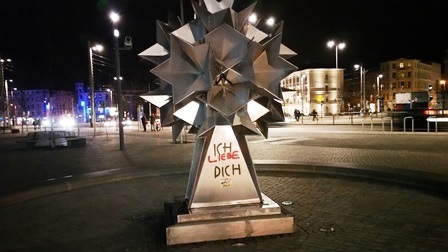
Submitted by Collin Clark on the 2017 winter session program in Leipzig, Germany sponsored by the Department of Languages, Literatures and Cultures…
As the days melt away into weeks here in Leipzig, my classmates and I have noticed quite a few differences in our day-to-day interactions, both with the locals and with each other. I never thought I’d be so self conscious or ashamed of my culture as I frequently am, riding on the streetcars across the city or eating with my friends. I want desperately to not be “an American” in every sense. We’re loud, we barely speak the language, we eat out far too often and many of the customs here are lost on us. Sometimes, when we are all relaxing and having a good time, I’ll have to pull back and remind everyone that we’re drawing a ton of attention to ourselves,which is the exact opposite of what the Germans do. Seen and not heard is an accurate way to express what I believe is society’s expectation of the German people.
Perhaps only a day ago, we rode the streetcar into the city, minding our own business, and a man sat in the back of the train shouting into the phone in Arabic. I could sense the tangible discomfort. Of course no one was going to tell him that he should speak more softly, but all of us, Germans and Americans, blended into one quite, mildly put-off community that wished nothing more than for the man to realize just how out of place he was, and it made me wonder: how often do we do the exact same thing?
To me, part of learning the language is learning the culture, and I’ve found myself becoming increasingly critical of the way we do things in the United States. Here in Germany, the public transportation system is so comprehensive and so convenient, we see elementary school students riding it alone, the system is so familiar to them at the wise age of 8. How many of us would ever dare to ride the subway in a major city alone, much less allow our three-foot-high child to navigate its meaningless rails? Yet, this is the German way and because of it, there is almost no traffic, less pollution and a general culture of very mobile people.
